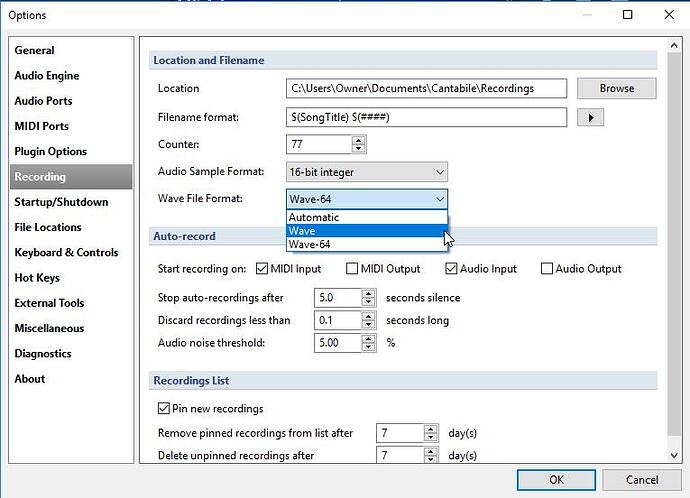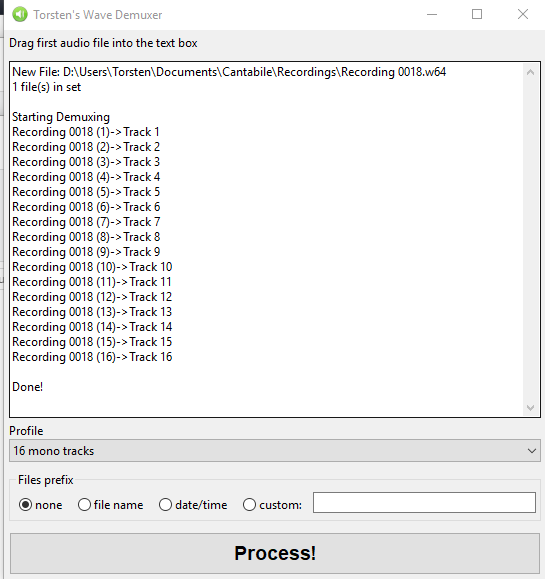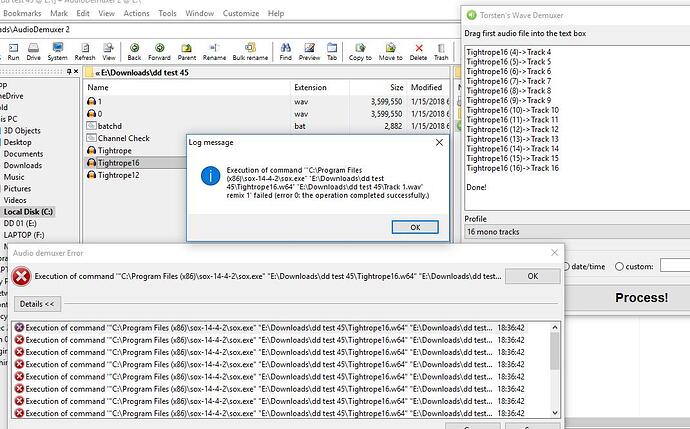I use the recorder extensively. I then have been using Audacity to split out the tracks into stems that are later brought into my DAW.
So, my first question is whether there is a better tool than Audacity for performing this task.
I always record at 44,100, 24-bit, but Audacity only offers to export the stems at 16-bit OR 32-bit float. I’ve been using 32-bit float, but those files are much larger than I’d like! So, I’d like to know what to use that will export 44,100/24-bit as recorded?
BTW - a couple comments for newcomers to using Cantabile as a recorder:
Cantabile creates a composite file with all the channels contained within this single composite file. That is why I need to split it into stems.
It saves to either .wav if the composite file is up-to 4 GB in size, and as .w64 (or Wav64) if over 4 GB, which mine usually are possessing typically 6 or more stereo tracks. From W64 File - What is a .w64 file and how do I open it? :
"The W64 format was designed to surpass the 4 GB limitation of Microsoft’s 32-bit RIFF/WAV specification. W64 files are 64-bit and allow for file sizes greater than 4 GB. This enables audio files to have a much longer duration.
NOTE: The Wave64 format was developed by Sonic Foundry but now is maintained by Sony. The official name of the format is “Sony Picture Digital Wave 64.”
You can create dummy channels for your VSTi’s and effects to be sent to by simply making output channels in the Audio Ports section in Options without needing to assign them to anything - they will appear in the Recording channel selectors, and putting a checked box beside those will include them in your recording.
Be careful of your levels - I’m not 100% certain of this, but it seems that these recordings are pre-fader and pre-effects. That is, they are the raw input of the instrument, microphone or VSTi as it comes in. So, watch your levels, as Cantabile’s faders, built-in limiter, or other effects do not seem to be applied here - it is capturing the raw input without limiting. (For the first several attempts I constantly was overloading the inputs for these tracks, even though everything was copacetic during the show for the master outs. If you are recording at 24-bit or higher, you can under-feed these inputs quite a lot (like -15db) and still have all your dynamic range faithfully captured.)
Many DAWs will have nothing to do with the .w64 files and will not load/import them, and even Sony’s Sound Forge (which it was designed for) is difficult to work with for me, but I’m not used to Sound Forge yet as regards using it for multi-track. Audacity works flawlessly, allows you to remove empty tracks and convert the mono-pairs into stereo tracks. The only issue is what I explained above as regards being stuck with 16-bit or 32-bit float output.
I’ve tried and failed trying to directly import .w64 files with Digital Performer, Samplitude and Harrison Mixbus. Perhaps other DAWs will, but I do not own those.
BTW - Cantabile also records a fine multi-track MIDI file that loads into any DAW perfectly.
Terry


 So off hand do you use the same number of channels in your W64 files and if so how many do you use in your “channel layout” ? I can get you going without the fancy interface if you can stand a Command window for the input and then poof the files appear after being split. Given time I can see it getting put in a better wrapper … lol:grin:
So off hand do you use the same number of channels in your W64 files and if so how many do you use in your “channel layout” ? I can get you going without the fancy interface if you can stand a Command window for the input and then poof the files appear after being split. Given time I can see it getting put in a better wrapper … lol:grin:


